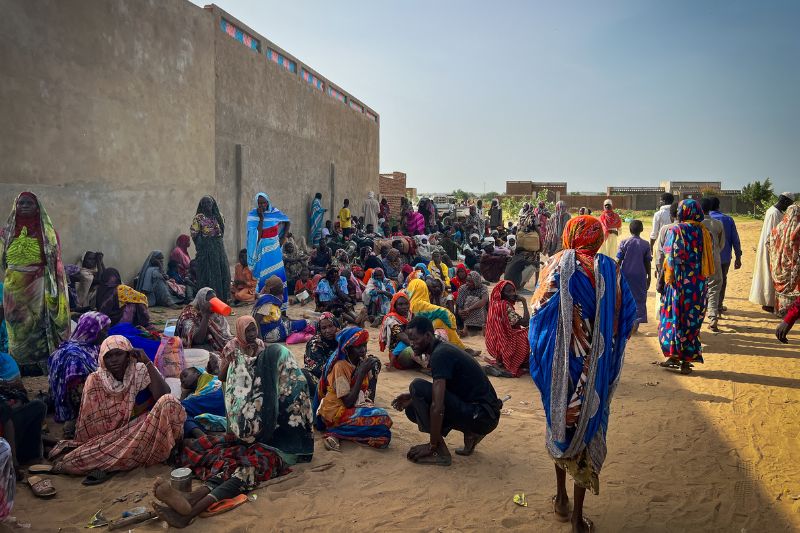If you think the events in Sudan right now are an emergency without warning, think again. The current conflict is instead an acute symptom of a crisis that has plagued the country for decades. The people of Sudan have been suffering for far too long from political turmoil and economic instability. The escalating humanitarian needs have left many Sudanese in ‘survival mode’.

Last year alone, humanitarian needs reached their highest levels in a decade, with violent conflict and food insecurity among the many challenges people have been facing while significant flooding hinted at the country’s vulnerability to rapidly changing climate patterns. The situation was further worsened by the surge in fighting between armed groups in Darfur, Kordofan and Blue Nile states, which displaced more than 3 million people, almost 2.5 million in Darfur alone.
Meanwhile Sudan also hosted more than one million refugees from neighbours such as South Sudan and Ethiopia, who themselves fled violence only to find themselves stuck in another conflict further affecting their ability to cope with their escape from misery and death.
Before the current conflict, the alarm had already been raised about the critical needs of people in West Darfur, and emphasising the urgency of scaling up the humanitarian response to the already fragile healthcare system. Now, we have witnessed first-hand the collapse of the health system and fast-growing levels of medical and humanitarian need across the country, placing great numbers of people in a life-threatening situation. The UN estimates a 57 per cent increase in needs since December 2022.
Since 15 April, people in Khartoum and other states have suffered due to heavy fighting, airstrikes and mass looting. Another wave of displacement of 1.4 million civilians is being reported as newly displaced, with women and children particularly affected. The current violence has led to shortages of food, water, medicines and fuel, causing prices to surge and making it increasingly difficult for people to access medical care at a time when they need it most. In Khartoum, El Geneina, Zalingei and in other cities and towns where heavy fighting continues, people remain trapped, while many hundreds of thousands have been fleeing to safer areas of the country or across borders.
Despite immense obstacles, agencies like MSF remain determined to support the people of Sudan to the best of our ability, providing critical healthcare to those in desperate need. Our teams are currently active in 10 states in Sudan, involved in various activities, such as treating war wounded individuals in Khartoum and North Darfur; providing healthcare and water and sanitation services to refugees, displaced people, and local communities in Al-Gedaref and Al-Jazeera states; and donating medical supplies to healthcare facilities across Sudan.
'From our humanitarian experience in conflict zones, we know the scale of danger that conflict poses to civilians who cannot or choose not to evacuate, including medical staff who remain to provide care to the sick and wounded.'

However, there has been a pattern of attacks on healthcare facilities and disregard for civilian lives that has made it increasingly difficult to deliver vital healthcare services during this critical time. For instance, in Nyala, south Darfur, we were forced to suspend activities after one of our compounds and warehouses were violently looted on 16 April. In Khartoum, another warehouse was also looted and occupied, with medical supplies, fuel and vehicles stolen. Fridges were unplugged and medicines left exposed and, on the floor, meaning they can no longer be used. On 26 April, the El Geneina Teaching Hospital (where MSF managed the paediatric and nutrition departments) was also looted, with parts of the hospital damaged or destroyed. The hospital remains closed following the attack.
The theft of supplies and vehicles, harassment of medical personnel, and the proximity of violence to healthcare facilities and infrastructure collectively impede the efforts of medical and humanitarian workers in responding effectively to the dire situation. These attacks are not isolated incidents. Rather, they are indicative of a broader pattern where warring parties show a disregard for civilian lives, infrastructure, and healthcare facilities. This trend poses a serious threat to the provision of essential healthcare services and exacerbates the already challenging conditions faced by the affected population.
Administrative and logistical challenges are also impeding MSF’s medical activities. Moving supplies from one part of Sudan to another can be extremely difficult. Similarly, although MSF was able to bring emergency teams into Sudan during the first weeks of the conflict, it has since been challenging to obtain permission for them to travel to project locations or secure visas for additional staff. How can we possibly continue carrying out our activities without an acceptable level of protection for our staff and for the people unable to reach medical facilities due to constant threats and obtaining a level of accessibility of our supplies and teams to move and deliver aid?
From our humanitarian experience in conflict zones, we know the scale of danger that conflict poses to civilians who cannot or choose not to evacuate, including medical staff who remain to provide care to the sick and wounded. Parties to the conflict must take all necessary measures to protect civilians from harm and ensure that those who are sick, wounded, or in dire need of medical support have access to healthcare facilities.
As I pen my closing words, I can’t help but wonder how many lives that should have been spared are being lost at this very moment. In the face of ongoing conflict and attacks on healthcare in various locations, it is imperative to ensure the safety of medical personnel and health facilities to ensure effective healthcare delivery. This entails enabling safe passage for ambulances and individuals seeking medical assistance, as well as facilitating access and rapid and unimpeded movement for humanitarian workers, organisations, and supplies to go where they are needed. Too many lives are hanging in the balance, and we cannot stand by as people are put at risk. It is vital that civilians affected by the fighting are afforded access to emergency healthcare.
Stephen Cornish is General Director of Medecins Sans Frontieres/Doctors Without Borders (MSF).
Main image: Over 600 war-wounded Sudanese arrive in Adre´ hospital. As violence rages in West Darfur, wounded people are coming in waves to Adre´ hospital in Chad, where they are being treated by MSF and Ministry of Health teams. At least 242 wounded were received on 15 June alone, and 348 on 16 June. (MSF/Mohammad Ghannam)